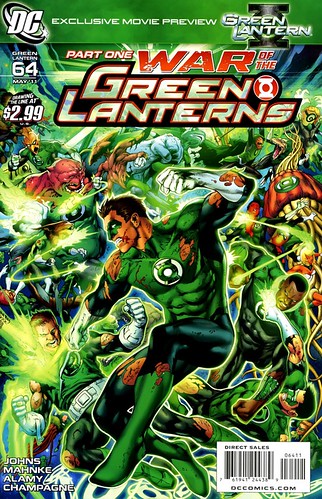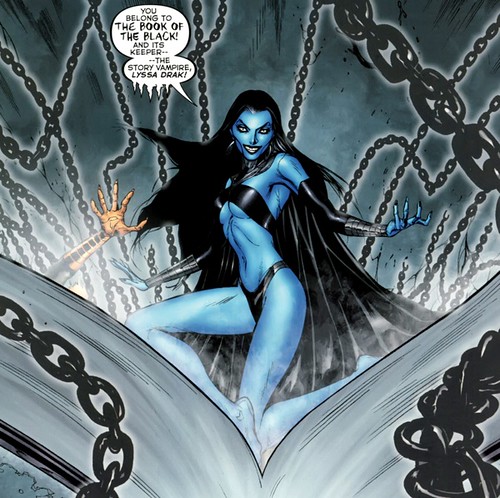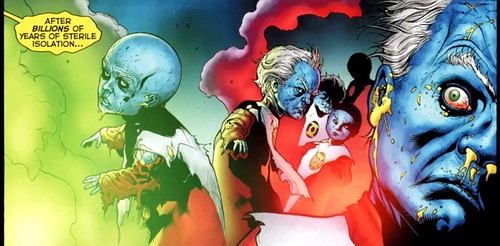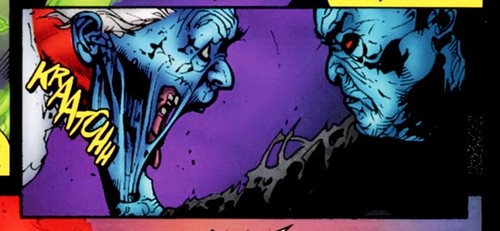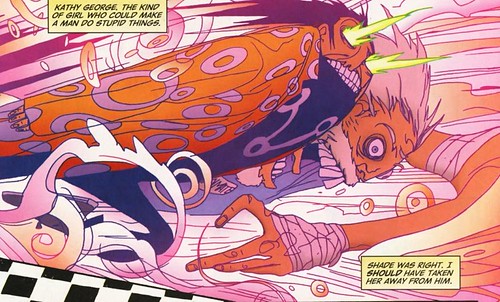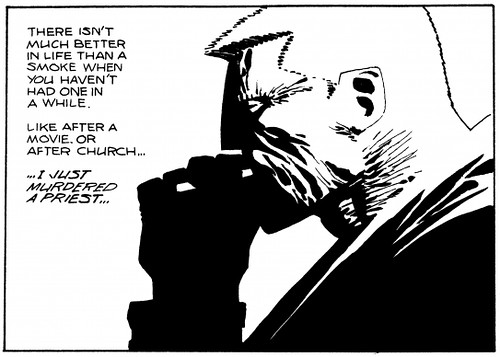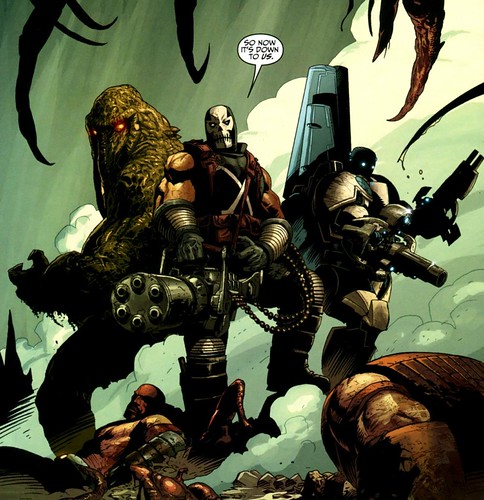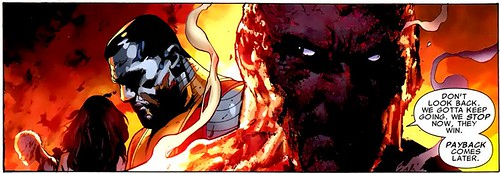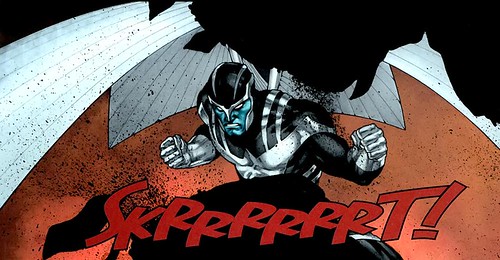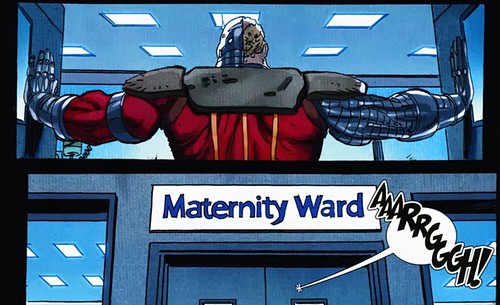What follows is an experiment, never to be repeated, wherein I read as many of the last week's new comic books and graphic novels as I could find, and provided ratings on most of them. Brian suggested splitting it into two posts, but after some consideration, I've decided to publish it all at once, because it was stupid, and stupid shouldn't breed. The act of "reviewing" this many comics--quite a few of which are clearly not designed for drop-in readers, even more of which do not (nor should) include me in the target audience--is a fundamentally hideous idea, one that can in no way benefit me as a human being who wishes to do other things with his time. Whether it can benefit anyone else is beyond me to say, but I would strongly recommend never, ever, doing this.Echo #24, Abstract Studios
Impressive how Terry Moore keeps pumping these issues out on a pretty regular schedule. Story isn't one I'm really into--evil corporation, sci/fi stuff, government agencies gone rogue--but after reading a couple of these, the comic does seem to have lots of stuff happening in each issue, and it's always competently put together. (This issue isn't the best example of that first statement, unless you get turned on by people shoving flash drives down shirts and disappearing in parking lots.) It's not in the slightest bit funny though, and there's always lots of what seem to be jokes. OKAY for me.
Tom Strong & The Robots of Doom #4, America's Best Comics
Chris Sprouse has this thing he does with Tom Strong's jaw, where he just draws small triangles made out of parallel lines to define the curve--it's really pleasant. That's not a very valuable thing to say, neither Savage nor Critical, useless information, i'm mentioning it only because it stuck out. This comic--i liked it. It has a weird choice of focus in it, one of those comics where there's way more time spent on making up science fiction reasons to explain the A-Team style "make a giant drill we can ride on" portion of the comic than there is the part where Tom Strong meets a subterranean race of people who have evolved to the point where they are on fire all of the time. The colors never pop, it's like watching a television that's missing most of the brighter spectrum. But it's still GOOD, a well drawn comic with a pulse.
Mouse Guard: Legends of the The Guard #3, Archaia
Guy Davis doing a story about an art critic who goes out and learns a lesson in real life experiences! Still not enough to push it past OKAY.
Betty And Veronica Digest #207, Archie
I think these are just reprints, so I'm skipping this one.
Veronica #202, Archie
This actually gets very exciting and uncomfortable in a pretty extreme way, because it really does seem like something sexxxy is going to happen when Kevin (he's the cover's "hot new guy", Archie's first out-gay character) takes Jughead back to his house to meet the folks, as the comic up until then has consistently made clear how perfect the two gentleman are for one another. The uncomfortable part is that there's no way for the reader to forget that they're reading an Archie comic, which means that you know, for sure, that Jughead and Kevin will not make out, no matter how much time is spent strongly implying that's the exact thing that is going to happen. So there you sit, pensively waiting on the moment when something tone-deaf (and gay-panicky) happens to tear the two apart. I was surprised then, as nothing actually did, the story just builds and builds and builds to a moment that should happen, doesn't, and then the comic ends. Arguably, that's probably the best way to handle them not kissing--if they aren't going to hook up, why not never give a reason, thus insuring that the reader immediately knows what the real reason is, which is that a corporate publisher is scared of alienating people who shit their pants whenever same-sex fictional characters kiss.
The gay aspect is handled pretty much the same way that previous Archie comics handled interracial dating--they just present it as fact, with little to no comment. Kevin's just gay, that's all, there's no reason for the characters to react to this in any specific dramatic way. It's surprisingly mature, considering it being, you know a fucking Archie comic. If Kevin had a gigantic knife sticking out of his head, it would be aggravating that no one ever says "we should probably take you to the hospital" or at least, "aieeee", but producing a gay character and not making a big deal out of it, choosing instead to immediately incorporate that trait into a classic Archie story--Jughead fucks with Veronica--is my 800th reminder that these comics are successful things because they're produced by professionals, no matter how gross their history is in terms of creator relationships or, of course, how banal I find every single one of them to be. As a comic, these are almost always CRAP, but as an Archie comic, it's probably GOOD.
The Amory Wars: In Keeping Secrets Of Silent Earth 3 #4, Boom! Studios
Didn't realize how popular this was until a few weeks ago, when a bunch of stores were beating the drums to find more copies of one of the collections. Also somebody crying, Beatles in the 60's style, at a Coheed & Cambria signing? The nasty thing to do would be to call this unreadable, but it probably makes a lot of sense to somebody who has read previous issues or listened to the album it's based off of/tied into/in some relationship with. No matter what it is about--i'm still not sure, space and beards is my best guess--I hate it when there's long scenes in a comic where somebody talks to themselves at length to explain the plot. Chris Burnham's art is fine, but this struck me as a total EH.
Cars Adventures of Tow Mater #2, Boom Studios
This comic's plot is taken from a storybook for young children. One part is about a tow truck (from the title) involved in a competition to see who can catch the most tires, and the other part is about a fire truck on trial for thievery. At the end of the comic, the fire truck breaks down in tears while on the witness stand. EH.
Disney's Hero Squad #8, Boom Studios
Couldn't find this, not sure if its an American comic or another English translation of Italian stuff, which is what most of the Disney books seem to be.
Do Androids Dream Of Electric Sheep #something, Boom Studios
Couldn't find a copy, never been able to make it through an issue.
Dracula: The Company of Monsters #1, Boom Studios
Kurt Busiek is behind this one in some kind of Alan Moore Doing The Courtyard kind of fashion, and the comic reads like it has a little more professional thought to it than Boom's Hunter's Fortune or Calling Cthulhu Chronicles, which seem pretty thin on the story front while being overstuffed with lots of sass. But when it comes down to it, ancient vampire lore stuff is better done in short paragraphs in Mignola comics, and crazy corporate uncle types unaware they're Waking Ancient Evil is an old hat full of grandma's ashes. Art's rushed, but it's Boom and that's the case with all their stuff. Another EH.
Incorruptible #9, Boom Studios
Horacio Domingues art seems like a weird choice for the book; it's so reminscient of storyboards for an 80's cartoon that it actively works against Waid's dour, super-serious tone. I haven't read enough of this series to be totally confident in any criticism of it, but I'll admit to never buying what seems to its primary engine--an evil supervillain who used to torture innocent women decides to flip sides, cuz, "evil"--but Waid is able to deliver the thing that seems to evade lots of other super-hero writers, which is a real sense of "well, what next?" In a way, it reminds me of Fables--something that I enjoy rarely, and then only for the sense of completion that's attained when certain B-plots resolve themselves. EH, I can't work up a lot of steam for Boom in either direction.
Muppet Show Snow White #4, Boom Studios
Real quick, because I'm almost done. (I'm not reading/writing about these comics in order, which I probably should've done, so that you can follow the mental collapse that occurred Friday afternoon when it dawned on me what a monumental asshole I am for even thinking this was a good idea--if you care, this is the last issue I read.) Muppet Snow White: everybody loves the Langridge stuff, and they should, because its really well put together and very unique in its utilization of the variety show format. This isn't by him, but it's funnier than I expected, and it ends with a bunch of gigantic explosions that kill all of the Muppet characters, except for Miss Piggy and a small prawn character I don't remember from when I was a child. She marries the prawn, because Kermit is dead. Also, so is everyone else. I thought this comic was pretty GOOD, and it's definitely one of those things where the context of the massive death I just described should be examined before one assumes that the extinction of all the Muppet Show characters is in any way connected to the death/dismemberment plan style of comics that's been under such frenzied attack as of late.
The Amazing Screw-On Head and Other Curious Objects, Dark Horse
Probably would've rated the opening story VERY GOOD or EXCELLENT if I'd been not-writing about comics on Savage back when it came out. I think I'll write more about this later. Pretty EXCELLENT though. The black and white art pages in Mignola collections are more interesting than a lot of full length comics, and the new material here (of which there is quite a bit) is all pretty amazing, especially "Prisoner of Mars", which is even funnier than Screw-On Head.
Baltimore: The Plague Ships # 2, Dark Horse
Really gorgeous cover on this one. Mignola is a master of big, looming figures, but it's always a reward when he draws something as simple as a bat. (Okay, it's a big bat.) Ben Stenbeck handles the interiors, and the war story pages are probably the best thing he's ever done, the sort of art that makes you cringe when you remember how rushed and cheap Dynamite has gotten on some of those Battlefields issues. Not a lot happens, story wise--at least half the comic is a background story, delivered in mostly silent panels after the main character snaps at a busty girl and says "You want a STORY? I'll TELL you a story." She actually seemed to just want a chit-chat. This was GOOD.
Buffy The Vampire Slayer #36, Dark Horse
Hey, a Lost joke. I never made it past the second season of that show. Can I understand this comic anyway? And isn't "vampire rights" from True Blood? Wait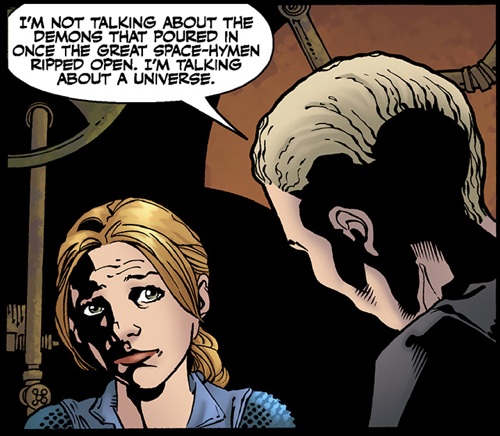 This is ridiculous. I've watched less than 15 minutes of this television show. I don't get this, couldn't begin to tell you if it's a good version of whatever that thing is or not. I rate this NOT APPLICABLE.
This is ridiculous. I've watched less than 15 minutes of this television show. I don't get this, couldn't begin to tell you if it's a good version of whatever that thing is or not. I rate this NOT APPLICABLE.
Conan something #23, Dark Horse
Couldn't find a copy. Probably like the rest of the Conan comics.
Giant Size Little Lulu #2, Dark Horse
What seems like an odd delivery system for Little Lulu--gigantic, Tolstoy-sized tomes--starts to make sense when I remember that its not intended for the line-culture clubhouse, but the voracious adolescent reader. Taken in small doses, this stuff is GOOD to VERY, taken all at once, it's an arduous journey into madness I recommend you never take. my favorite part is when lulu tells a story to the little girl or the time she tricked tubby into doing something he doesn't want to aghghghga so many pages
Hellboy The Storm #3, Dark Horse
No question here--this is some of the best stuff Duncan Fegredo has ever done, and his panels of ravenous hordes of evil is fighting for pantheon status in the Best Mobs of Anything category. Story wise, this is one of those comics where so many specific story points from previous series--the Baba Yaga, various prophecies, the seven-in-one, and of course, Gruagach, who is breaking hearts on the daily--take some gigantic 90 degree twists, putting the Hellboy series back on the track of being the most exciting version of serialized comics that is currently available. (Fantastically enough, it's only competition was the BPRD.) Visually, Hellboy never slowed down. This was EXCELLENT, for the hell of it, I read it seven times. It was my cookie.
Star Wars Clone Wars Digest Volume 7 Hero Of The Confederacy, Dark Horse
Couldn't find it, pretty happy about that.
Batman Cacophony, DC
This fucking life... oh, it's so fucking hard. So long. Life ain't short, it's long. It's long, goddamn it. Goddamn. What did I do? What did I do? What did I do? What did I do? CRAP.
Batman Confidential #48, DC
Batman Confidential is the dump ground book, my understanding is that DC went a bit too far buying pitches for the series a while ago, so being "all over the place" is part of its DNA. If you remember how bad Legends of the Dark Knight got--which was pretty bad, especially considering how truly great that series once was--Batman Confidential has been even worse. The current storyline, which this is the conclusion of, is actually a sequel to last year's (?) Batman & Superman Versus Aliens & Werewolves. It includes all the characters, the same creative team, plus zombies and voodoo characters. There's a page in the comic that blows the panel construction apart, something wrong on the actual layout level, not the printing. Lots of "you done got the Superman" and "child" from a voodoo priestess stand-in. Batman does kick off a dude's head. Enough. This is CRAP.
Brightest Day #9, DC
(Includes mention of current real world environmental problem, should be disregarded as entertainment by those in the "i read comics to escape" demographic.)
Some of this is engaging to look at, with the horrible horrors and Green Arrow throwing-arrows-around action. But for the most part, it's like reading an issue of Countdown, or half of one of those Blackest Night one-shots. Pieces of plot are moved incrementally forward, lots of blood is shed, and then it ends, with the promise of more. But nothing is "revealed", it's just bloodletting and doom-saying, laced with some sub-Moore/Claremont/yer favorite purple writer, like this one, which is my favorite or least, depending on what point I'm trying to make: "Holes in souls, souls in holes, Climb Out, Take Hold, Let Go, Wake up, Dream the Dream, Love is Vengeance, Vengeance is Love". Yeah, that's exciting. Maybe next time it'll be a sonnet. AWFUL.
Freedom Fighters #1, DC
This is a really violent comic book that opens with some group called the Aryan Brigade killing Native Americans in a casino while talking smack about the Jews (in Arizona, where they believe what they're doing is now legal), and from a purely intellectual viewpoint, I suppose they deserve credit for making actual anti-semitic remarks, because that's something that neo-Nazi's do all the time, unless they're the Red Skull or other comic book characters, whose hate always seems more abstract. It's still a bit strange though. No matter what criticism is made regarding super-hero decadence, and no matter how little impact the bloodshed in Brightest Day has on me, I find myself stiffening up a bit when I read "win the race war against you injuns, the jews and all the other mongrels" and the stiffening doesn't really go away until the comic book gets to a part where the President admits that the Confederacy (from the original Civil War) probably had a weapon of mass destruction that they never used and could Uncle Sam, the Ray, Phantom Lady and some more D-level super-heroes go find it please? Yeah, sorry. This is a comic about Uncle Sam leading a super-hero team on a mission to find the Secret Weapon Of Mass Destruction of the Civil War. Why does it need serious Neo-Nazi villains? EH.
Jonah Hex #59, DC
So gorgeous, like all the Bernet issues. Honestly, some of this Hex stuff stands alongside Torpedo and Solo. Bernet just knows when he's got the simple stuff nailed, when he can just leave a panel empty, when he can indicate a mountain range with a single line and leave it at that. The sound effects are the best sound effects any DC comic has had in recent memory, and the set-up for the fight page (where Bernet lays out where everyone is) is actually more powerful than the bloody axe takedown that concludes it. Art alone, this is VERY GOOD.
JSA All-Stars #10, DC
This is a serviceable super-hero team comic that stood out to me mostly because the art seems devoid of traced drawings, and although it's buried in some really "shiny" color work (somebody else used that word to describe it, not sure what it means, but it does seem to fit), it's kind of impressive. I didn't really like reading it, but I did think it was funny how a bunch of non-flying super-heroes are abandoned to get-to-the-fight on their own, which means that they had to ride there in the bed of a pick-up truck. That's pretty funny. GOOD, I'm sure, for some, I can't muster up more than an EH.
Our Army At War Sgt Rock # 1, DC
Welp, here's your dose of 9/11 porn. This is AWFUL, but not because it opens with 9/11, not because it hinges on a really cheap final twist that goes back to 9/11 from the POV of jumpers, but because its one of those war comics that flat out refuses to spend more than a couple of panels on the actual violence.
R.E.B.E.L.S. #20, DC
Pretty much the defacto king of "not that bad" DC comics, this is one long fight issue. Because half of it features Lobo, artist Claude St. Aubin gets to show off, and the other fight--a three way between Braniacs--has a pretty decent twist at the end. You wouldn't rely on something like this as an industry foundation, but it's still GOOD.
Red Hood, Lost Days #4, DC
Couldn't find it, can't stop crying about that. How will I find out what happened in between issues of other comics I didn't enjoy reading the first time through? Answer me that, America.
Secret Six #25, DC
They spelled the artist's name correctly this time, that seemed to be a problem last month. Otherwise, this is more of the same, which isn't a complaint. Secret Six has gone on longer than anybody probably expected it would, it's more deviant than anyone probably thought it would be (this issue features a lubed-with-sunscreen handy), and while it's never the kind of funny you actually laugh at, there's some okay smirks throughout. Probably GOOD, I'd lean more towards OKAY.
Superman The Last Family of Krypton # 2, DC
Sometimes the little kids look like elderly people in little bodies. So cute. Superman gets his name for a central casting ex-hippy. This was supposed to be a graphic novel, right? The art is strange, the comic is long, and it's weird how writers always get the opportunity to do a New Take on Superman and still end up doing the exact same story beats, no matter what. AWFUL.
Tiny Titans The First Rule of Pet Club, DC
Some kids really like these, some kids really hate them. Kids are great, they're absolutely nothing like adults, and that's awesome. There's just No Bullshit with kids and comics. Dumb, smart, cute, horrible--they're all the same in one aspect, which is that they look at a comic and immediately know whether they're into it or not. If they're into it, they're all in, as deep as it gets. If they aren't--and they have no filter, they figure it out in a split second--they don't even attempt to tolerate. It's not an argument, it's a choice. Now, I can't stand reading the Tiny Titans, but I respect the choices made in creating them, there's obvious craft in their construction. But they have no value to me beyond that, making them CRAP. But for their intended audience, I think these are probably on the GOOD side to VERY and I'm sure their fans think they're EXCELLENT.
The Wild Kingdom, Drawn & Quarterly
Yeah, this is the stuff. It's a hardcover reprint of Or Else #4 with a few color sections, a few new pages and a bit of rearrangement of the original order. Or Else #4 was VERY GOOD/EXCELLENT, this is no different.
The Boys #46, Dynamite
Russ Braun certainly seems to have slid right in and done a nice amalgamation of Robertson while getting a chance to draw some prize-winners all on his own. Although the main thrust of the current arc is Hughie discovering that his girlfriend is one of the "supes" his job it is to police, the most interesting portions of late have been the collapsing friendship between Mother's Milk and Butcher--no surprise there, Ennis really puts his heart into platonic friendships between men, even more so when they go south. GOOD.
Green Hornet #7, Dynamite
Scripty, one weird portion that concludes an argument (will you keep this a secret? yes i will) only to repeat the argument on the next page (will you keep this a secret? yes, i will). Same rushed art as all these Dynamite books have, but maybe this pencil-to-colors style is some new wave thing. Still pretty AWFUL.
Green Hornet Annual #1, Dynamite
Actually worse than the other one, although it is readable. There's some very Warriors-esque character designs, that never fails to make me cringe. AWFUL.
Blackbeard Legend of the Pyrate King #5, Dean Koontz's Frankenstein Prodigal Son #1, Queen Sonja #9, Stargate Vala Mal Doran #3, Dynamite
Couldn't find any of these, put the titles down purely because they're a good indication of the taste level at Dynamite.
Amulet Volume 3, the Cloud Searchers, Graphix
While I haven't finished this yet, this is probably (in the neighborhood of 99%) the most "important" thing released this week, month, in the contender for year, simply because there's nothing on this list that's got as voracious an audience as Amulet does, and the people waiting for this volume are going to re-read this book to the tune of 20-30 times at least, which is something that almost none of the other books on here are going to experience. (That repetition doesn't make them better, I definitely think Huizenga and Mignola released "better" comics this week on a qualitative scale, but the impact the Amulet series has on "the next generation" of readers vastly outstrips almost everything else--like Bone, this series is crazy fucking popular, and the wait for it has increased the anticipation to a fever pitch. If you think of comics like a cultural organism, Amulet is the blue dye that's going to color entire portions of the body, while something like Brightest Day only captures a finger. My line started at Batman, their line is starting right here, these comics.)
One thing--and this is more political than it is anything else, but you can skip reading it, so I'm not sorry--that I've been thinking about after reading comments section like this, and posts like this, is that the positive side of no-super-heroes-for-young-readers is that the comics that young readers do have are, occasionally and frequently, a lot better than the super-hero comics that I read as a child. Bone, Amulet, those Little Lulu reprints, the Olympians series, Mouse Guard...those are off the top of my head, all easily available (and recognizable) to children, they're much-loved, shared, passed around and ingested, and that's in part because children don't have to bother with the output of super-hero comics publishers. Maybe kids are being deprived of new super-hero comics they can pick up on a regular basis, but they certainly aren't missing out on "great comics" by the loss. The first things I read in this medium that weren't in the newspaper--I love them, still, I read a bunch of them a few weeks back--but they aren't, and weren't, very good comics in the way that Bone and Amulet are very, very good comics. The new kid's comics, these non-superhero things that are so explosively popular, are well made and meaningful in a way that what I read simply wasn't, and they also happen to be the sort of simple on-message positive stories that shine a spotlight on how super-hero comics aren't really about Being A Better Person or Helping Your Friends or Not Judging Books By Their Cover, but mostly about Being Cool and Being Crazy and Being Awesome. (And Being Gross, that too.) Which is fine, I'm not qualified for armchair dictation of creative purpose, those things all work on me at times, I like Awesome, whatever. But I'm not going to pretend that the idea of "more monthly single issues of Batman for 8 year olds" is my dream for a healthy industry, because, honestly, that would just be in the way of them reading something that is on a qualitatively higher plain. There's no new Spider-Man title a child could enjoy? That's not a bad deal! Hell, the only thing a kids super-hero comic would offer a Bone/Amulet fan, at this point, is the chance to master that phrase "If the story's good, I don't care how bad the art is..."
Scarlet #2, Icon
If this turns into an actual revolution, which causes an apocalypse, and the book turns into a study of the post- of that apocalypse, I would totally be into that, even with this art, which begs the question why it's so hard to "break into comics", when you can google image this kind of stuff in about 9 seconds. Here I go: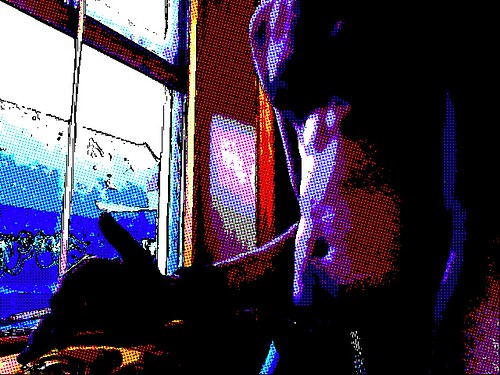
That took less than five! Thank god for 2010's dedication to exhibitionism.
I still like the Daredevil stuff Maleev did, but c'mon. This is getting old. AWFUL.
5 Days To Die #1, IDW
Couldn't find it, Brian has it covered though.
Angel Barbary Coast, IDW
Hey, I remember when this came out. Really hideous covers. Now that IDW lost the Angel stuff, I wonder what television show they'll use to publish six-to-eight one-shot comics almost nobody wants next. (I couldn't find this trade.)
Bram Stoker's Death Ship The Last Voyage Of The Demeter #4, IDW
Conclusion of a four part horror story adaptation: not the best place to start. I liked the linework, there's some real life to it, but the coloring in this comic is so dark that it takes work to find the art underneath. Story is old school vampire on a boat stuff. OKAY.
Classic GI Joe Volume 9, IDW
I own a copy of Volume 2, and I refuse to spoil whatever it contains just to twist some more knots into the noose I've created for myself here. I'm want this to be OKAY at least.
GI Joe A Real American Hero #158, IDW
Thanks to the success of X-Men Forever, no cancelled comic has to ever really end, hence the existence of this, GI Joe The Real American Hero, which picks up after the conclusion of the old series. The Joe's are rogues, Cobra work for the gub'ment, Snake Eyes gets stabbed in the leg. It's AWFUL, really cheap looking and lacking in the specificity of character that the old Joe stuff delivered. Ignore the outfits, forget the names, and there's no distinction between any of these characters.
GI Joe Hearts & Minds #4, IDW
This comic is split into two sections, both of which end with whatever character being focused on saying "My name is ___. I am ___." (The second blank is either "Cobra" or "G.I. Joe".) Basically, you're dealing with two back-up stories mashed together to make a comic. This issue focuses on Dr. Mindbender (by Chaykin) and Doc (by Antonio Fuso). They're OKAY back-up origins, but they seem like the sort of thing that could've stayed on a computer screen, or, you know, as back-ups.
Spike The Devil You Know #3, IDW
Pretty standard buddy story set mostly in a casino and a casino parking deck, with Spike acting like somebody who bases their personality off of John Constantine comics, as opposed to someboy who basing theirs off of Andy Capp, which is how I roll. I know even less about Spike than I do Buffy, but this made enough sense to be comprehensible. AWFUL.
Strange Science Fantasy #3, IDW
Odd little comic that was supposed to be online and ended up in print first. The style--three rectangular panel pages, with giant captions--ends up separating the action and panel-to-panel plotting so much that the comic is a lot more like a children's picture book than it is a comic. This issue is a one-shot noir story set in a world where some people have film cameras as heads. OKAY.
Transformers Last Stand of the Wreckers, IDW
I read an issue of this the first time I tried to do one of these "everything I can find" pieces. (I never finished it.) It was pretty weird.
We Will Bury You, IDW
This was sold out when I went looking. I've talked to Zane Grant some, he was part of the reason I finally got a bike. I should've done that when I first moved to New York, but I'm a stupid, stubborn child. He's a good guy, great taste. I'll try to find this. (You have to use the word "try" when you're talking about IDW.)
Wire Hangers #4, IDW
Couldn't find it. Title reminded me of Mommie Dearest, but Google says this is a horror comic.
Robert Bloch's Yours Truly Jack The Ripper #4, IDW
Huh. Not sure if anything happened in the first three issues, because this seems to make perfect sense even without reading them. Jack the Ripper is some kind of demon tied into a human familiar, the traitor-is-revealed, tragedy strikes, bad guy both wins and loses at the end. CRAP, but I couldn't be the wrong-er audience for this without cameos by Glee characters.
Choker #4, Image
Not as Warren Ellis-y as the initial issues. This chapter moves more into large scale slaughter comics, which gives Templesmith the chance to do that thing he does so well, which is large panels of gruesome violence. Cops taking slobberjaw steroids seems like a not-so-unrealistic possibility in our contemporary world, credit for that. OKAY!
Cowboy Ninja Viking #8
I wonder if they'll someday do a director's cut of this comic that removes all the extraneous lines and digital ink splashes that are layered onto all these drawings. Rarely does a comic try so hard to achieve some weird idealization of indie comic authenticity. As with every issue of Cowboy Ninja Viking I've ever read, the story (lets find an atom bomb) takes a back seat to some of the most egregious affectation you can find outside of Seth's innumerable hats. AWFUL.
Hack Slash Vol 3 Friday The 31st, Image
Couldn't find, never read this series.
Haunt #9, Image
From a letter in the back: "Will we see Haunt ever use any weapons like a rocket propelled grenade, an uzi, or a sniper rifle? That would look so sweet!"
I'm not going to pretend i'm the right guy for this comic, but I'm glad they've found him. Not as bad as the first issue (which was CRAP), but this is still an AWFUL comic.
King City #11, Image
VERY GOOD. I've really enjoyed King City, but ever since the eighth issue, I've kind of wanted the comic to abandon all of its characters so it could focus on the ex-soldier suffering from chalk addiction and PTSD. That's some pathos, that guy broke my heart. Great comic though, very violent in the same languid, cool-dude way that the characters eat sandwiches. Cat masters slicing henchmen (and their threats) in two, leaving halved carcasses in causeways. Going to be a heartbreaker when this series ends.
Murderland #2, Image
This is about a mercenary team with a super-powered shape-shifting Rapunzel, it has some nice art from David Hahn (although the settings are almost universally kind of bland, another comic where almost all of the panels take place against color backgrounds). It's not the easiest story to understand--the character's behavior and relationships make sense, their purpose for acting like vigilantes and being overly-sensitive about death doesn't--but there's one pretty striking line of dialog during the Afghanistan part near the end that'll stick with me more than some of these comics. OKAY!
Nancy In Hell #2, Image
Huge plot dump and a lot fewer panels where the main character points her crotch at the reader. (There were six of those on the first page of the prior issue.) Assuming this is supposed to be a mix of exploitation/black humor/gross-out horror, it pretty much fails on all accounts, is therefore CRAP.
Noble Causes Volume 10 Ever After, Image
There's ten volumes of this? I've never seen one. Couldn't find.
Savage Dragon United We Stand, Image
Is the next one called Divided We Fall? I would've read this if I had found it.
Amazing Spider-Man Presents Black Cat #3, Marvel
Thanks to a printing or lettering error that wasn't caught, this comic doesn't credit the first ten pages as having an artist. There's quite a bit that happens in it plotwise, some of which seemed kind of funny. (Apparently the Kraven family hates noise? Except for drums, one assumes.) This moved along at a brisk pace, and after those IDW & Dynamite books, I was definitely glad for that. GOOD.
Avengers Childrens Crusade #2, Marvel
Wolverine really wants to kill one of the members of the Young Avengers as well as the Scarlet Witch. I don't have any feelings for the Scarlet Witch other than being mildly confused by her, but I wouldn't mind seeing a story where Captain America stops and says "wait, are you saying you're down for killing children? We might need to rethink why we keep teaming up with you." This was also GOOD for what it was, although I don't think I'll read future issues.
Avengers Thor & Captain America Official Index To The Marvel Universe #5, Marvel
This was one of the two things I completely put my foot down to. I refuse to read these things, and I refuse to believe that they contain any information that isn't easily available in far more depth on a thousand different websites.
Captain America Forever Allies #4, Marvel
To steal a word my wife sometimes uses for comics, I though this was pretty charming. It's a set-in-the-old-days story lacking in those contemporary jokes about the future, or at least lacking ones I recognize, and Nick Dragotta draws a pretty great straight-from-Caniff female villain. It's not far removed from those Brubaker Captain America stories that jump back and forth between WW2 and now, but not in an irritating way. I wouldn't have read it if I wasn't trying to do this, but I'm OKAY with having done so.
Deadpool Pulp #1, Marvel
This is Deadpool as a Canadian spec ops soldier who went crazy after being tortured for a really long time in a prison camp. It's not funny in the way that Deadpool comics sometimes are--in fact, it's pretty much cover-to-cover nasty--and the art seems purposely off-putting at times, with interchangeable bodies and an addiction to overly shadowed faces that obscure every character's emotional reaction. Pretty EH.
Deadpool Wade Wilson's War #4, Marvel
I heard this was good, and maybe it was, but I couldn't find it.
Franken-Castle #20, Marvel
I couldn't find this comic in time, but I did get an email last week regarding the monologue that Daken (the Dark Wolverine!!!!) gives about why he hates cops and enjoys killing them. It was a lot more intense then that song by Body Count, but not as catchy.
Gorilla Man #3, Marvel
Missed my window, couldn't find a copy.
Hawkeye & Mockingbird #4, Marvel
It seems like the line "WCA Assemble" should be a bigger deal, but maybe I'm just confused in assuming that "WCA" means "West Coast Avengers", maybe it means something else. I wouldn't say that I liked this very much, but...I don't know. There's a full page of the two main characters kissing, which I think is something that's been put off for a little while, and there's something sort of pleasant about that, that a kiss between two characters is the most important thing in the comic. There's a lot of excitement in the letters page--"how awesome was it to see Hamilton Slade transform"--you know, that kind of thing. From the way Abhay described the series, I suppose this is a total fan-service comic, but it lacks the cynical manipulation that DC's fan-service comics have. Again: OKAY.
Hercules Twilight of a God #4, Marvel
I consider myself to be a pretty dumb person whose most marketable skill is remembering useless trivia information, and therefore it upsets me to say that I was horribly confused by this comic. It seems to be about Hercules fighting Galactus or a black hole, or a black hole that ate Galactus, and Hercules has a kid who is older than he is, and his horses bite off people's arms, and he feels a lot of pain when he walks. I'm not even sure if this comic is bad or not, it confused me that much. It's the second to last one I read, after trying to start it three other times and giving up two pages in. I'm going to rate it as I'm Sorry.
Heroic Age 1Month2Live #1, Marvel
This feels a lot like it's trying way too hard to be A Grown-Up Comic With Spider-Man and Mr. Fantastic, mostly because the main character and his family are so similar in terms of basic attributes to every "suburban middle-aged white guy who hateshateshates the choices" story ever told. This just strikes me as something that fundamentally misunderstands the reasons why people choose to read a Marvel comic, like--this story, these characters--what could adding super-powers to the mix possibly bring to it? What audience is there for this beyond the curiosity seeker? Maybe it's just the influence of certain comics critics, but I no longer think it's that beneficial to bring the spotlight onto Marvel's civilian characters, because, honestly, why would anyone choose to live in Marvel's New York? Why would anyone be happy to see the Avengers, the X-Men, after all the death and destruction their presence brings in its wake? It would be one thing for them to be treated with some fantastic license, but they aren't, it's just this bludgeoning REALISM, this thing that incorporates the depressions of everyday life (CANCER!) and (SACRIFICE!) into stories where everyday life doesn't fit in the first place.
Oh god, shut up, me. EH. This thing's EH.
I Am An Avenger #1, Marvel
Pretty insane art line-up here--Chris Samnee, Jason Latour, Tom Fowler--that's crazy, I like all those guys. The first story is about people walking across a front yard and how that proves they are heroes, the second story is about how break ups suck, even if you're the Iron Fist or The Misty Knight, and the last story is two pages long and is about how nice it is to come home. OKAY? Yeah, that works.
Incredible Hulks #612, Marvel
Did that World War Hulks thing work for people? I feel like I've never heard anyone mention these comics, excepting those occasional "Jeph Loeb sux" monologues that show up from time to time in comments sections. I didn't read most of them, but I read a couple of the "key issues". Looks like I didn't need to even do that, because the recap page covers pretty much everything. Basically, all of the Hulk's supporting characters are some kind of Gamma-related monster now, but they all seem to have control over themselves when in their monster form. This issue is an aftermath/new storyline issue, so the only real new step it takes is to explain what a loveless marriage Betty and Bruce Banner had (which doesn't gel with what I remember from those old Peter David comics, but that's fine, she's been dead for awhile, people change), and how she's going to run around and do Hulk things like break shit with her Hulk powers. Bruce Banner is basically a cheap Iron Man without a costume when he isn't Hulk-ed out, everybody lives together in a trailer park and has a bar-b-que, it's very sit-comy, this comic. I call it EH.
Iron Man 2 Agents of S.H.I.E.D. #1, Marvel
Three stories here, one of them the scintillating tale of how Scarlet Johannson maneuvered herself into the position of delivering papers to Robert Downey Jr when he was boxing with Jon Favreau. This feels like a DVD extra, the kind you'd skip, and no amount of decent art (which it has for 2 of its 3 stories) is going to change that. AWFUL.
Iron Man Legacy #6, Marvel
Pretty ugly stuff here, Tony Stark is presented as an arrogant wino who doesn't drink, likes to show up at people's houses and criticize them for how they treat their homeless, mentally unstable relations within seconds of meeting them. This is just too middle road, really: it's either a super-hero comic or it's a humiliation comic, pick one. AWFUL.
Marvel Universe Vs. The Punisher #3, Marvel
The nice thing about this Punisher comic is that this is pretty much what he's designed to do: kill things, lots of things. Sure, he's also supposed to occasionally show up in other comics (like Spider-Man, Daredevil, cross-over bullshit) and act as the foil for basement dwelling arguments on the ethics of violence, but those are conversations best reserved for college, amongst people who can't break themselves from the fantasy (instilled by their parents) that they should do something at college besides what you're supposed to do at college, which is to learn about what kind of sex you like. Otherwise, this (tying a buck knife to an arrow and shooting the Hulk in the eye) is what you want the Punisher to do, and if you don't want the Punisher to do them, then you either A) don't like the Punisher or B) don't understand the Punisher. The first response is totally acceptable, the second is too, as long as you don't combine that lack of understanding with reading Punisher comic books, egg on your face and all that. In a nice little twist, this comic's plot also gets to totally tie itself to that Cooke/Kirkman/fingerfuck "controversy" (that's in quotes because I have to live with myself and can't care enough about the subject to pretend it's one worth me having an opinion on), because it's about a bunch of Marvel Zombied type super-heroes getting killed by the Punisher, because he is not sick, and they are, so sick that Mary Jane is pregnant (oh shit, you read REIGN, right?) and Spider-Man ripped out some people's throats at a baseball game. (AMERICA)
It's Goran Parlov though, so who cares? Goran Parlov wasn't put on this Earth so that he could draw the Tiny goddamned Titans. He was put on this Earth because the man was born to draw a knife going into the Hulk's eyeball. And sure, he was probably born to do other things too, people should follow their muse, even if their muse is twittering about bagels and fucking people over, because this is America, and you can build a mosque wherever you want, as long as it isn't on Garth Ennis's nutsack, because that thing is a tongue only zone. GOOD.
Marvelman Family's Finest #3, Marvel
Jesus, this is hard to read. There's a vague similarity to CC Beck, but Beck's stuff goes down so damn easy, so readable and funny and interspersed with this brilliant singular images, panels that you want to just yank out and blow up and frame. This is just half-assed and un-fun, it requires such a massive level of commitment just to remember what's happened in one panel so that the next one makes sense. AWFUL.
New Mutants Forever #2, Marvel
Seems to be less fetish-y stuff in this one than the X-Men Forever, but that doesn't unset the basic "whywhywhy" factor. "I've returned to the New Mutants to tell the stories I never got to tell, like the one about when a middle-aged woman ran around in the tenements of Brazil while Cannonball got his flesh burned down to the Red Skull core and Warlock accidently burned someone to ash". This is CRAP, dude.
Origins of Marvel Comics X-Men #1, Marvel
This is the other thing I'm not reading, no way. When I was a kid and couldn't afford the comics I wanted, I bought Who's Who and whatever else to learn about them, but now: there's no point in something like this unless your job blocks Wikipedia.
Shadowland #3, Marvel
Marketed as a street level team-up book, it turns out this is about demonic possession and corny lines like "I can no longer call myself the Master of Kung Fu", (yes you can, Dopey Smurf). It's bad comics, if that makes a difference. There's some old timey tricks that still have bulges left in their muscles--really, the only good thing that comes out of Marvel's heavy-handed Bring Back The Punisher trick is whenever he shows up in the middle of a fight and just shoots people instead of dicking around, Peter Parker style--but if this story isn't desperation, it should stop wearing desperation's mini-dress and rubbing its hand on please-care-about-me's inner thigh. Still, if the goal was to go way off the reservation in terms of "things that Daredevil does" stories, this is sort of that. AWFUL.
Shadowland Elektra #1, Marvel
I wouldn't say that this read-em-all project was worthwhile because of this comic, but if I hadn't have done it, I wouldn't have seen it, and it's worth looking at. Not having the anime/manga background of some of my peers, I can only tell you what this reminds me of (Blade of the Immortal and the first Golgo 13 movie) without making clear why that is. It's just a weird, un-Marvel, un-super-hero fight scene that I liked quite a bit, and that's totally in credit to an artist I don't remember seeing before. The comic has a really cheesy ending, but that's the way it usually goes with tie-ins--the part that "matters" always reads like a waste. OKAY.
Sky Doll Lacrima Christi #2, Marvel
Yeah, I don't get this comic. I still remember the first time I read an issue--a six dollar comic with 12 pages of actual content shoved in front of 30-odd black and white sketch pages of the same 12 pages, and on the cover, a girl with giant eggs where her breasts should be. EH, because the people involved seem to know what they're doing in terms of drawing eggs-breast-girls.
Taskmaster #1, Marvel
Jefte Palo on art, that's usually nice, Fred Van Lente doing his best imitation of Jason Aaron on Ghost Rider, that's okay too. I'm not a huge fan of comics that call out memorable movie lines, but if you're going in that direction, that scene where Gary Oldman screams Ev-eRY-Onnnnnnne is a good choice. This is OKAY.
Thor For Asgard #1, Marvel
When this is set or where or whether it "counts", I don't know. It's the comic where Thor pulls the Asgardian version of "we don't negotiate with terrorists", which translates to "we have to kill these innocent women and their children because the Frost Giants are using them as human shields". Then the dude goes home and gets laid. Weird comic, I guess it's OKAY. I'd be able to tell "that doesn't seem right" if Daredevil started punching homeless women or Batman stuck a needle into somebody's eye, but I don't know Thor that way, so maybe this is exactly what Thor comics are supposed to be like.
Wolverine Road To Hell #1, Marvel
I heard you're supposed to read this before you read the other Wolverine comic, but I heard that too late in the game and ended up reading it second. Really doesn't seem to matter, as far as I can tell. Giuseppe Camuncoli and Marjorie Liu continue to double the fuck down on making Daken into the most ridiculous caricature of an American Apparel-loving young man--someday, people are going to look at these drawings and react the way we do to Bob Haney's Hep Cat dialog now. The Aaron part is Wolverine falling for a bunch of pages, it's very boring. This was EH.
Wolverine #1, Marvel
I didn't read those Supergirl comics that Renato Guedes drew, but I remember thinking that his character designs for her were more interesting than I thought that character deserved. I think that ended badly, and that thought (accurate or no) left me predisposed towards liking what Guedes had to bring here. Unfortunately, this just doesn't seem to work, and Aaron seems to be focused on doing the exact opposite of what he did in Ghost Rider and Weapon X, which is take everything really, really seriously. EH.
X-Men Curse of the Mutants Smoke And Blood #1, Marvel
Wow, this is some really unusual art for a Marvel comic, even more so a tie-in event comic. Here:
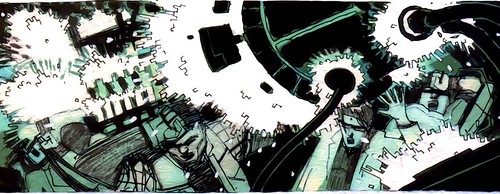 See what I mean? That's pretty cool. The story is an overlong trapped-with-monsters shindig, seems like mercenary work, a tie-in comic where the writer wasn't given a huge amount of freedom or information. It ends with an argument about magic versus science, one has to hope that wasn't the only thing the reader was supposed to get out of it. Maybe it'll come up later in the main arc that this is tied into, but it seems doubtful. There's so many of these things, and it would be really nice to know if this model (lots of one-shot tie-ins, four issue mini's, the model used for World War Hulks, Shadowland) is actually working. It's great that they're giving so many non-stock artists/writers the work, but it would be a hell of a lot better if it was on something that had a real future to it, and that just doesn't seem likely.
See what I mean? That's pretty cool. The story is an overlong trapped-with-monsters shindig, seems like mercenary work, a tie-in comic where the writer wasn't given a huge amount of freedom or information. It ends with an argument about magic versus science, one has to hope that wasn't the only thing the reader was supposed to get out of it. Maybe it'll come up later in the main arc that this is tied into, but it seems doubtful. There's so many of these things, and it would be really nice to know if this model (lots of one-shot tie-ins, four issue mini's, the model used for World War Hulks, Shadowland) is actually working. It's great that they're giving so many non-stock artists/writers the work, but it would be a hell of a lot better if it was on something that had a real future to it, and that just doesn't seem likely.
Young Allies #4, Marvel
This is very reminiscent of Teen Titans, and I seem to remember that's how it was marketed when it began. Not sure which characters are in love with each other, but that's certainly going to be in the cards. Two non-powered characters seems like one too many, especially since neither have a bow and arrow, but maybe they can make a trade for a hero to be named later.
What a horrible joke. This comic is OKAY.
Stumptown #4, Oni
Greg Rucka gets a lot of credit for what he doesn't do--porny shit with girls--and that's deserved, but only to a point. At the end of that line of praise, it always reminds me of that Chris Rock routine where he lambasts people who want credit for not beating their kids or paying the light bill. Like--good job not being gross, but not-being-gross isn't that hard to do, because "not doing something" is an action absolutely every single human being is capable to taking.
Anyway: the issue itself. It's GOOD, a nice, classic conclusion to the Rockford Files/straight genre story that this series has consisted of since the beginning. And yet, no matter how much work Matthew Southworth put into it, and he put in quite a bit, I can't help wondering why this is a comic and not a television show. It's plotted like one, with plenty of build-up-to-break moments, it rarely utilizes anything that's very specifically comic-y about it (the first issue had some moments, but the part in this issue where the main character is knocked unconsious is visually no different than every single time Jim Rockford got knocked out)--there's just not a lot of evidence that this needs the paper and staples, or that there needs to be three months in between the commercial breaks.
Last Days of American Crime #3, Radical
Really surprised by this. It's one of the last ones I read, I was kind of putting it off after not having enjoyed much of Radical's output. And while I think the faces in this comic could use some work, the characters and linework in this comic is really, really fluid. I think this is one of those comics that is probably being acknowledged mostly for its crime-y plot--which, to be honest, is a bit generic, futuristic setting or no--when what's actually special about it is what the artist is doing. GOOD, definitely.
Torchwood #2, Titan
This is a couple of stories originally published in a Torchwood magazine, one by Paul Grist, the other by Brian Minchin and Steve Yeowell. The Yeowell art seems really rushed, but maybe I'm just remembering Sebastian O too fondly. The Grist story is well drawn, especially the part where the "Ianto" beats a skeleton to death (?) with a fire extinguisher, but it's the second of a five part story and isn't very interesting. EH, I don't know who these people are or what it is they're supposed to be doing, and I've actually seen an episode of this show.
Angelus #5, Top Cow
And then there's this. I try to be as open about liking women, naked women especially, as possible without being all gross about it. I'm into women, let's leave it at that. But this--this reminds me of when I was a kid, and the neighbor had a copy of Juggs magazine, and I saw the reviews for some porno movie that involved thirty or so guys having sex with a pregnant woman in a Florida backyard. Nothing's as creepy as a fetish you don't share, and this--a cornball soft-core sex scene that goes on for multiple pages--isn't in me. CRAP.
Darkness # 84 Lance Briggs C2E2 Variant Cover, Top Cow
Not reading this, because the content it contains came out over two months ago. However, I do give the cover--which is a picture of a Chicago Bears linebacker wearing a Darkness t-shirt--an official EXCELLENT, as it will help me the next time I get in an imaginary one-sided argument after reading something about integrity and hard work on a corporate comic executive's twitter feed. If you ever need evidence of how quickly comics are willing to sell themselves out at the first whiff of celebrity endorsement, a variant cover featuring a football player's picture on a back issue is definitely going to be the one to beat.
Magdalena #3, Top Cow
Nelson Blake, the artist for this comic, has been known to say "comics is a meritocracy". And hey, maybe he's onto something. EH.
House of Mystery #29, Vertigo
Part of this is about three people traveling from Hell to New York City and arriving naked, another part is about some women escaping from a dungeon when an old stuffed bunny arrives and shoots the guard, and those parts seem to be the main story. There is another part, about a goblin army led by a homophobic goblin, and during that part, the comic takes a break to tell a story, which I think they do in every issue of this comic. The story is about a goblin that eats babies. For some reason, they have a Clayton Crain-y type draw that part--since the story is supposed to be funny, it seems like it would've worked better if somebody like Johnny Ryan had drawn it. Instead, it relies on the dialog to make the story funny, which doesn't work out that well. I'm thinking AWFUL on this one.
I Zombie #5, Vertigo
I'd stopped giving this a chance after finding the first two issues dull, so it's pleasant to find out that I've missed nothing, as that seems to be the main ambition here. In this issue, the zombie girl makes a possible love connection with a white-suited monster hunter. As this will probably be the conclusion of the first trade paperback, I'd be curious to see if anyone is going to want to read beyond what's on display here. EH, because at least Allred's getting paid.
Sweet Tooth #13, Vertigo
This series keeps trucking along, with the big hunter guy slowly making his way towards the redemption that the initial story arcs advertised in the brightest lights that "foreshadowing" would allow. Although I appreciated the brevity it requires to read Sweet Tooth due to the nature of this little assignment I've given myself, I can't imagine this being a very satisfying comic in monthly installments. EH, Vertigo sure can guarantee mediocrity these days.
Astro City Special Silver Agent #2, Wildstorm
The word that best describes this is "sincere", and while that's fine and all, it's a little too much. The opening pages barely make any sense--visually or verbally--but after that, its an easy comic to follow. It's similar to that Jack the Ripper comic, in that it's hard to imagine what the first issue of this was about, as the entire story seems to be on display here, even if you skip the recap page. EH, although I do kind of want to push higher just because it's so goddamn passionate.
The Authority #26, Wildstorm
Always a surprise this is still being published. No copy available.
Kane & Lynch #2, Wildstorm
Okay, let's try writing this before I use google to figure it out. 1) this is a video game comic? yes? 2) this is about two guys with facial hair. 3) kind of like the way that christopher mitten draws the first car wreck. second one isn't as nice, but some of the faces start to fall apart around that part too, so maybe it was rushed.
[google break]
Jesus, i'm completely blind. Of course it's a video game, there's advertisements on the back of all of these DC comics for it. How embarrassing! This is EH, because of the car crash. Without that, AWFUL.
Jack of Fables #47, Vertigo
Jack doesn't seem to be the star of his own comic, but that leaves space for lines like "sheath those udders" in reference to a breastfeeding woman, so...I don't know. Sometimes I stop a take a look at my life for a second and realize: this is kind of my fault, not me specifically, but me as a type of person, because I just don't even have a response to those kinds of lines anymore and don't immediately grasp whether they're offensive or not to women or mothers or comic book characters. Like, who fucking cares about what happens in consumer entertainment, which is all this is, really, but it bugs me, this lack of caring I have, makes me realize I'm part of the problem, because I'm disinterested in other people's feelings. I see people online get heated up about stuff and its just--I should be making up something to care about, shouldn't I? And yet I'm more offended by something like Shuddertown #3, because it was just so blatantly cheap and sleazy, page after page of photoshopped pictures of James Gandolfini talking to photoshopped pictures of Giovanni Ribisi, ending with photoshopped pictures of Julianne Moore. But even that really didn't "offend" me, not as much as that fucking Eat, Pray, Love trailer, which struck me as the most shallow, racist bullshit that Julia Roberts had ever participated in, and she's kind of responsible for a lot of that kind of crap. You have to go to the poorest parts of the world to pray? Really? Because your shitty boyfriend is a shitty boyfriend? Why not skin a Somalian baby and use the interior musculature of its genitals as a wrinkle-reducing pore cleanser, you know, hell, they could make it a law that you have to give the Somalian baby a really good life for six months before you skin it, and since that's six more months of good-eating that the baby wouldn't get in Somalia, it all evens out in the wash, sort of.
Jack of Fables-the cliffhanger with the dragon was okay, the comic itself was EH.
IN CONCLUSION
Yeah, nevermind what I said before, I'm sorry about this. I rate me CRAP.
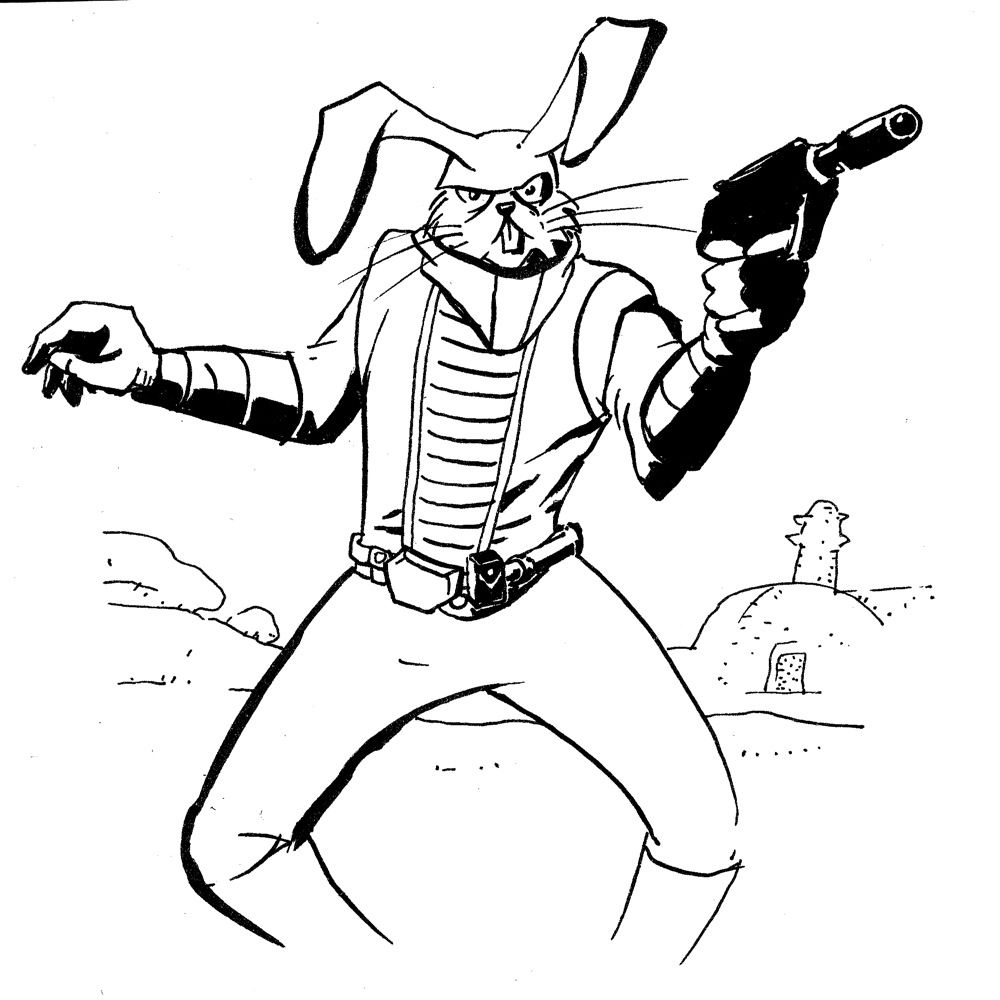 Jaxxon drawing by our very own renaissance man, Graeme McMillan...
Jaxxon drawing by our very own renaissance man, Graeme McMillan...


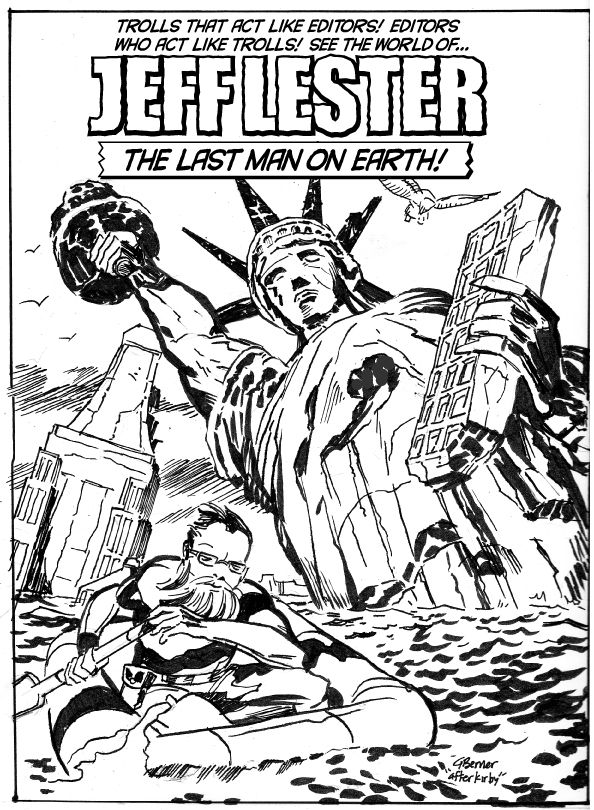
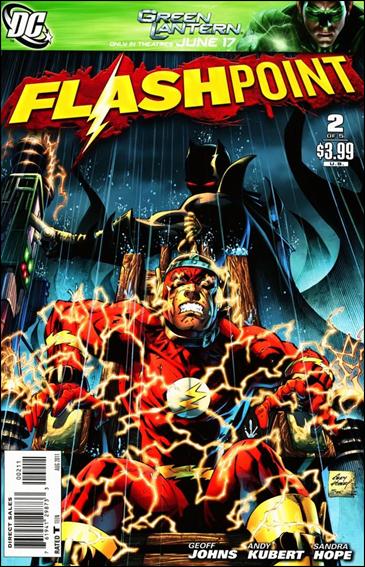
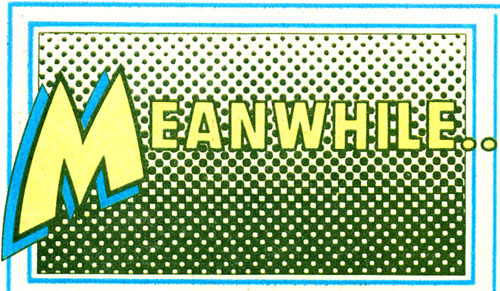



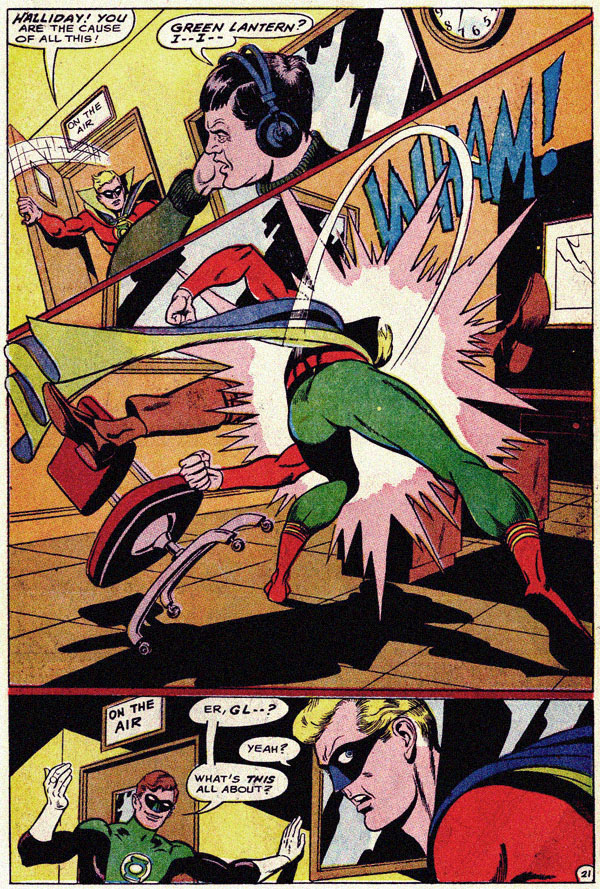



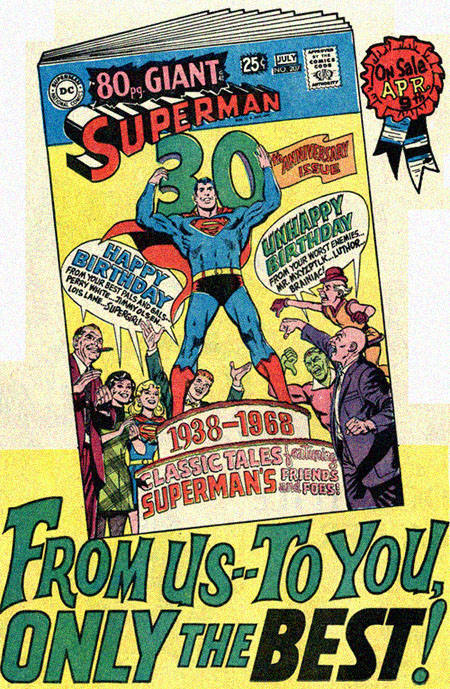





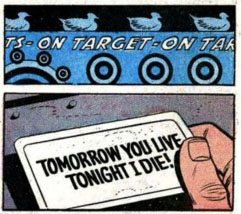
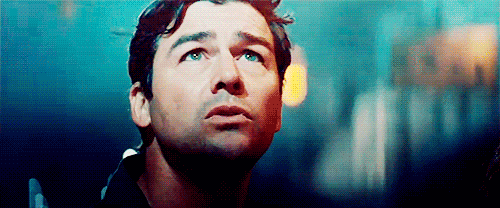


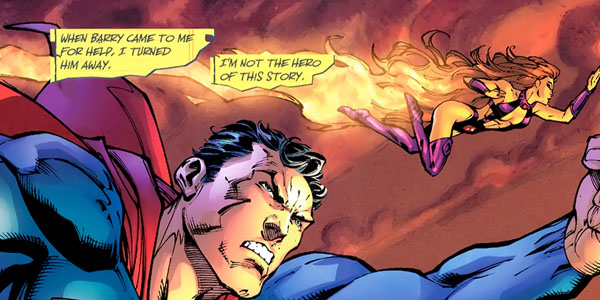





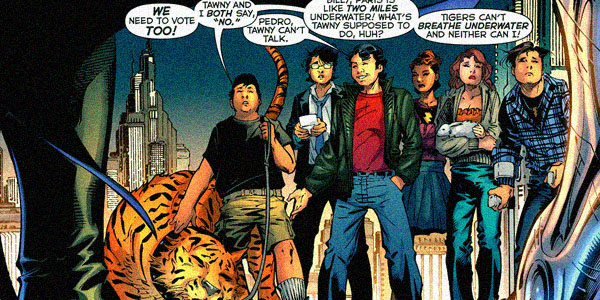
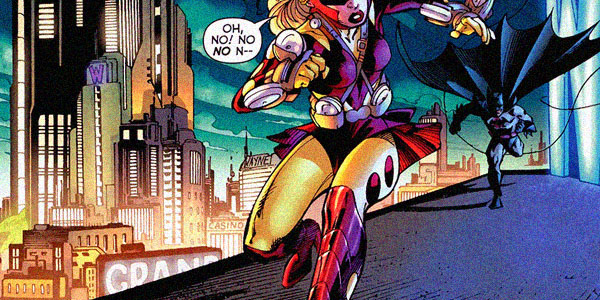
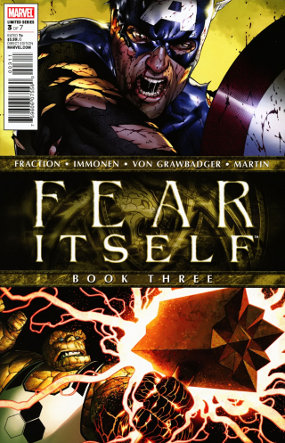




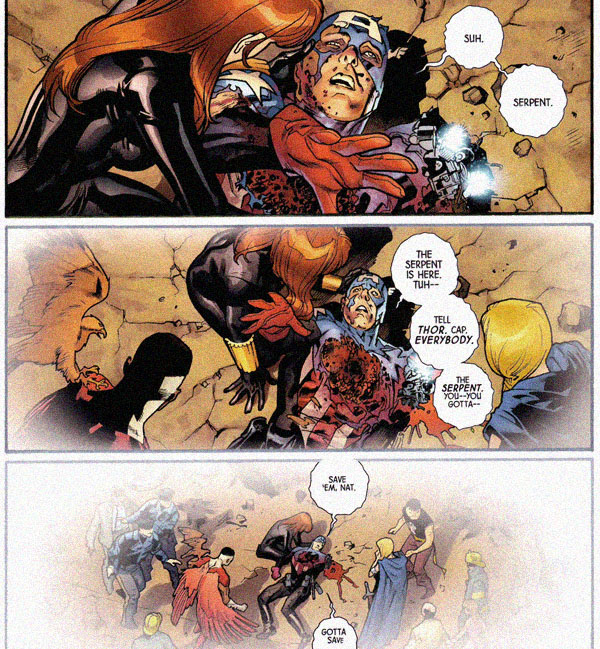
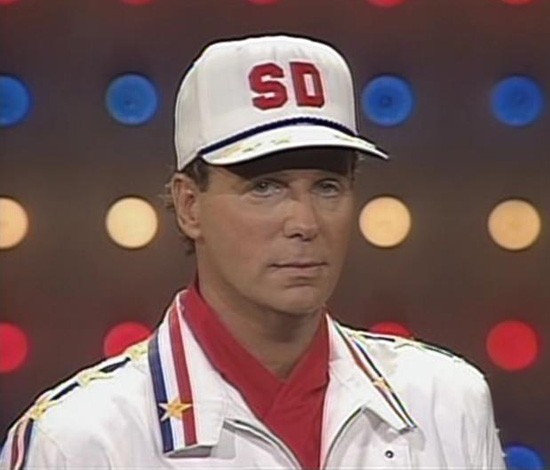
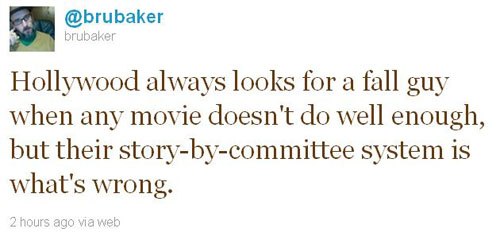
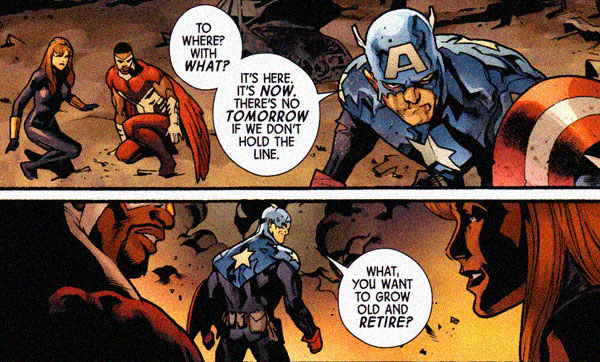


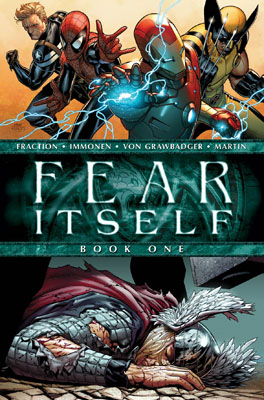



![An image of Iron Man, Steve Rogers and Thor from FEAR ITSELF #1. Quote from a recent interview with FEAR ITSELF's author promoting FEAR ITSELF #4: The scene next month [in FEAR ITSELF #4]... It's the first time that Iron Man and Steve Rogers and Thor have been in the same room in the series.](http://static1.squarespace.com/static/58c6f8b33a041115fb6baf1d/599ccf4de5a68b350fcf931a/599cd9cce5a68b350fd0e5ac/1503451596268/bakers-dozen.jpg?format=original)










